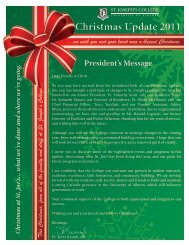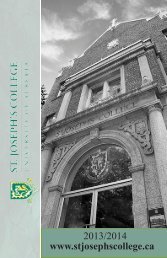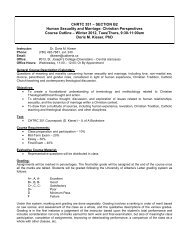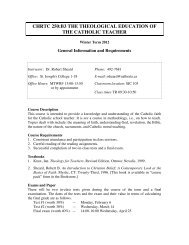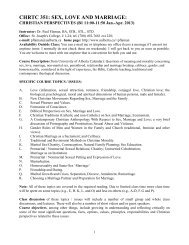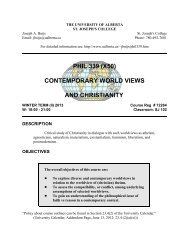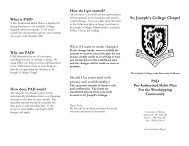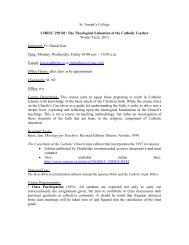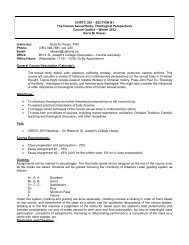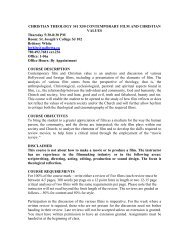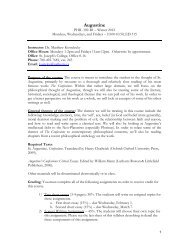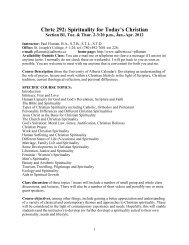CHRTC 352 BIOETHICAL ISSUES: CHRISTIAN PERSPECTIVES ...
CHRTC 352 BIOETHICAL ISSUES: CHRISTIAN PERSPECTIVES ...
CHRTC 352 BIOETHICAL ISSUES: CHRISTIAN PERSPECTIVES ...
You also want an ePaper? Increase the reach of your titles
YUMPU automatically turns print PDFs into web optimized ePapers that Google loves.
constitutes any obtaining (or attempting to obtain) information from another student or any other<br />
unauthorized source (e.g. required reading materials or notes) during the exams, or using any other<br />
method of cheating. All students should consult the "Truth-In-Education" handbook or Website<br />
(http://www.uofaweb.ualberta.ca/TIE/) regarding the definitions of plagiarism and its consequences when<br />
detected. Plagiarism means to steal the ideas, words, images or data of another and pass them off as<br />
one's own without crediting the source (note the research assignment directives regarding properly<br />
referencing quotations and specific sources of information). Properly acknowledge all your immediate<br />
sources including speakers or interviews. No student shall submit in any course all or a substantial portion<br />
of any academic writing, essay, thesis, research report, project assignment, presentation or poster for<br />
which credit has been obtained by the student or which has been or is being submitted by the student in<br />
another course or program of the student in the University or elsewhere. A student who is caught cheating<br />
or plagiarizing a substantial part of one's assignment will receive nothing for that exam or assignment.<br />
The student will also be reported to the proper University of Alberta authorities. See the Code of Student<br />
Behavior regarding various penalties (30.4.2) including expulsion, and so forth. If one is having problems<br />
with an assignment or is excessively anxious about an examination, talk to the instructor beforehand. I<br />
will try to be reasonably flexible and fair.<br />
Grading: Students in this course will be graded following the U. of A. Letter Grading System, as<br />
follows:<br />
Grading in Undergraduate Courses<br />
Descriptor Letter Grade Point Value<br />
Excellent<br />
Good<br />
Satisfactory<br />
Poor<br />
Minimal Pass<br />
A+<br />
A<br />
A-<br />
B+<br />
B<br />
B-<br />
C+<br />
C<br />
C-<br />
D+<br />
D<br />
Failure F or F4 0<br />
Under this system, marking and grading are done separately. Grading involves a ranking in order of merit<br />
based on raw scores, an assessment of the class as a whole, and the qualitative descriptions of the various<br />
grades. Grading is in the first instance a judgment of the instructor based upon the student's total<br />
performance and includes consideration not only of marks earned for term work and final examination,<br />
but also of class participation, completion of assignments, a comparison of the class as a whole with other<br />
classes, etc. A pre-determined distribution of grades, e.g., a bell curve, is not used. Grades are subject to<br />
revision according to procedures and policies of the Faculty of Arts.<br />
Deferred Exams: A deferred midterm exam will be granted at the discretion of the instructor on 14<br />
Mar. 2013 from 2:30-3:30 p.m. at a place determined by the instructor. Students will be required to<br />
4.0<br />
4.0<br />
3.7<br />
3.3<br />
3.0<br />
2.7<br />
2.3<br />
2.0<br />
1.7<br />
1.3<br />
1.0<br />
6



